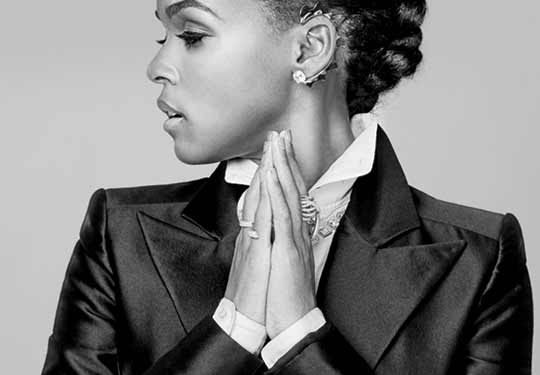Growing up in a working-class Kansas family, Janelle Monáe explored her own racial and sexual identity to find success as a singer-songwriter. A film career followed, with acting roles in the commercial and critical successes Hidden Figures and Moonlight. Now, at age 34, she’s mentoring and managing other artists as the founder and CEO of her own label, Wondaland Records.
As a child, what was your image of work?
Janelle Monáe: My father was a trashman. My mother was a custodian. My stepfather worked at the post office. My grandmother served food at the county jail. I saw them getting up every single morning, putting on their uniforms, living check to check, working hard. My idea of working was to work hard and contribute to your community. It’s my truth.
What was your first job?
Janelle Monáe: I was a waitress at Ponderosa Steakhouse. I also worked at Foot Locker and as a maid at a service where I would drive around with other women and clean middle-class homes to pay for school.
Which boss was your best?
Janelle Monáe: Probably the one that fired me. I worked at Office Depot during the day and I was in the studio really late at night sometimes. Work was getting in the way of my focusing on what I needed to do as an artist. When they fired me, I had no excuse. I had to go all in on my career.
How did you find your artistic voice?
Janelle Monáe: I found it when I felt like my voice was being silenced. Early in my career I would show up at a photo shoot, and stylists would say, “Hey, you’re in this tuxedo, and you’re wearing your hair natural. It’s a bit avant-garde. How can we sell that? Perhaps you should look like this.” Or record label execs would say, “You’re this Black girl talking about science fiction and technology. It’s not marketable. How about you just get a more simple song and not have your work be so dense?” Those conversations made me think, Okay, if I don’t find my voice, if I don’t speak up for myself, somebody else is going to do it.
People describe you as authentic and uncompromising.
Janelle Monáe: I don’t shy away from my lived cultural experiences. I’m a Black queer woman from the middle of America. I bring that with me everywhere I go. I wear it proudly. I might show up in a meeting with an astronaut suit on—I have several times, actually. We embrace the things that make us unique.
What attracts you to projects?
Janelle Monáe: It has to do with following your inner compass and your gut. I don’t think I knew that Moonlight would win Best Picture. I was just doing a film with a story that I felt needed to be told. It connected to my story and highlighted other marginalized voices that don’t get the mic a lot. It just aligned with who I am. I love making radical art that pushes a culture forward, that says something different and cuts through. I ask myself, “Who do I want to celebrate?” “Who am I okay with pissing off?” and “Who do I want to be included in this process—what kind of community?” I also want to like the people I’m collaborating with. Sometimes you learn from folks who might not have the same communication style and belief systems as you. But I’ve walked away from experiences that I thought would be stressful. I ask myself, “Do I need this in my life?”
How do you credit contributors when you’re the star?
Janelle Monáe: I have no ego when it comes to giving credit, especially when people have taken their time and put love and care into the project.
What’s your management style?
Janelle Monáe: When I’m collaborating, I want to hear from everyone. I’m looking for them to persuade me that this is the best idea for the team. What do you think? What do you think? What do you think? I’m taking in people’s thoughts and asking them to be very transparent about what’s moving them or not. I listen. I compromise more. I look for the greater good. Sometimes these conversations are long.
When I’m working on my own projects, such as an album, I have to take a more insular approach. It’s about where my heart is in that moment. I still like to know what others think; I just make the final decision.
How do you decide when to use your voice for activism?
Janelle Monáe: I’m not a politician. I’m an artist. I’m an American, and I care about this country. So I think I can critique certain things that I feel might be cancerous to the United States. Especially when the rights of those I love that come from my community are being trampled on, I feel a responsibility to use my platform to say something. These days I’m more about partnering with people who are doing the work on the ground, trying to get folks registered to vote, helping lower-income folks, and lobbying for women’s reproductive rights, protection for LGBTQIA+ communities, and racial justice. These are the issues I care about.
What has been inspiring you?
Janelle Monáe: I love the camaraderie and the collaboration that’s happening with women in the music world. You obviously have the #MeToo movement. You just see us realizing that we are indeed stronger and more powerful and more badass together. Obviously not every woman is for that cause. But I do see a concerted effort by women in leadership positions to squad up, so I’m really inspired by building that around the world.
Originally published on Hbr.org







